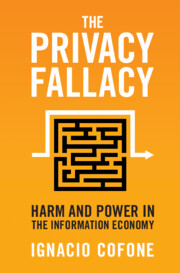Book contents
- The Privacy Fallacy
- The Privacy Fallacy
- Copyright page
- Dedication
- Contents
- Acknowledgments
- Abbreviations
- Introduction
- 1 The Traditionalist Approach to Privacy
- 2 Privacy Myths
- 3 The Consent Illusion
- 4 Manipulation by Design
- 5 Traditionalist Data Protection Rules
- 6 Pervasive Data Harms
- 7 Privacy as Corporate Accountability
- Conclusion
- Notes
- Index
6 - Pervasive Data Harms
Published online by Cambridge University Press: 16 November 2023
- The Privacy Fallacy
- The Privacy Fallacy
- Copyright page
- Dedication
- Contents
- Acknowledgments
- Abbreviations
- Introduction
- 1 The Traditionalist Approach to Privacy
- 2 Privacy Myths
- 3 The Consent Illusion
- 4 Manipulation by Design
- 5 Traditionalist Data Protection Rules
- 6 Pervasive Data Harms
- 7 Privacy as Corporate Accountability
- Conclusion
- Notes
- Index
Summary
Chapter 6 explores a different path: building privacy law on liability. Liability for material and immaterial privacy would improve the protection system. To achieve meaningful liability, though, laws must compensate privacy harm, not just the material consequences that stem from it. Compensation for financial and physical harms produced by the collection, processing, or sharing of data is important but insufficient. The proposed liability framework would address informational exploitation by making companies internalize risk. It would deter and remedy socially detrimental data practices, rather than chasing elusive individual control aims. Courts can distinguish harmful losses from benign ones by examining them on the basis of contextual and normative social values. By focusing on harm, privacy liability would overcome its current problems of causation quagmires and frivolous lawsuits.
Keywords
Information
- Type
- Chapter
- Information
- The Privacy FallacyHarm and Power in the Information Economy, pp. 110 - 137Publisher: Cambridge University PressPrint publication year: 2023
